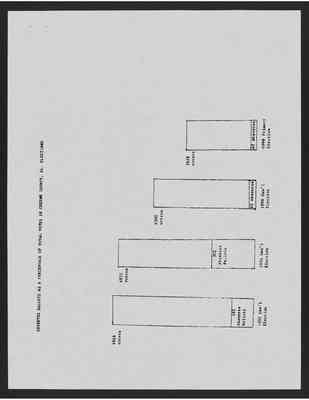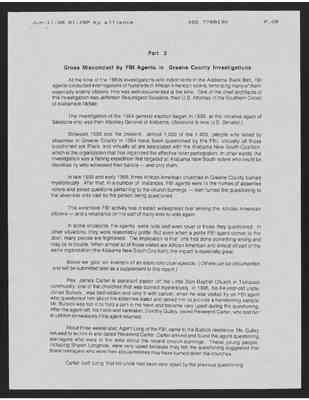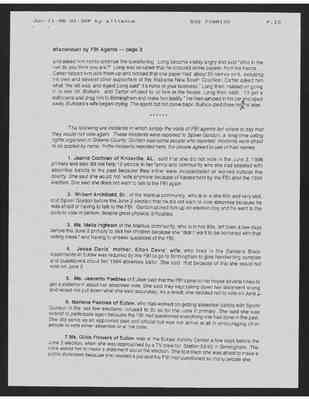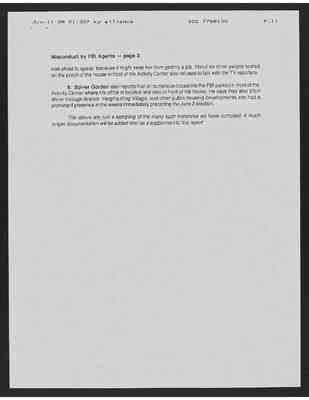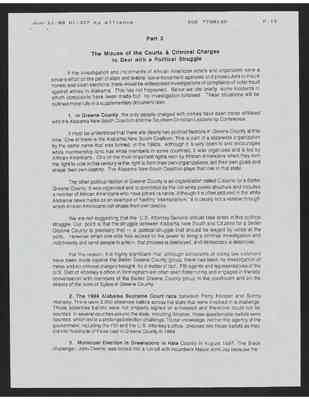Pages
6
ABSENTEE BALLOTS AS A PERCENTAGE OF TOTAL VOTES IN GREENE COUNTY, AL., ELECTIONS
[graph]
| 4868 voters | 4833 voters | 4300 voters | 3928 voters |
|---|---|---|---|
| 16% Absentee Ballots | 30% Absentee Ballots | 6% Absentee | 4% Absentee |
| 1992 Gen'l Election | 1994 Gen'l Election | 1996 Gen'l Election | 1998 Primary Election |
7
Part 2 Gross Misconduct by FBI Agents in Greene County Investigations
At the time of the 1980s investigations and indictments in the Alabama Black Belt, FBI agents conducted interrogations of hundreds of African American voters, terrorizing many of them, especially elderly citizens. This was well-documented at the time. One of the chief architects of this investigation was Jefferson Beauregard Sessions, then U. S. Attorney in the Southern District of Alabama in Mobile.
The investigation of the 1994 general election began in 1995, at the initiative again of Sessions who was then Attorney General of Alabama. (Sessions is now U. S. Senator.)
Between 1995 and the present, almost 1,000 of the 1,400 people who voted by absentee in Greene County in 1994 have been questioned by the FBI. Virtually all those questioned are Black, and virtually all are associated with the Alabama New South Coalition, which is the organization that has organized the effective voter participation. In other words, the investigation was a fishing expedition that targeted all Alabama New South voters who could be identified by who witnessed their ballets --- and only them.
In late 1995 and early 1996, three African American churches in Greene County burned myseriously. After that, in a number of instances, FBI agents went to the homes of absentee voters and asked questions pertaining to the church burnings --- then turned the questioning to the absentee vote cast by the person being questioned.
This extensive FBI activity has created widespread fear among the African American citizens --- and a reluctance on the part of many ever to vote again.
In some situations, the agents were rude and even cruel to those they questioned. In other situations, they were reasonably polite. But even when a polite FBI agent comes to the door, many people are frightened. The implication is that one has done something wrong and may be in trouble. When almost all of those visited are African American and almost all part of the same organization (the Alabama New South Coalition), the impact is especially great.
Below we give an example of an especially cruel episode. (Others can be documented, and will be submitted later as a supplement to this report.)
Rev. James Cater is assistant pastor off the Little Baptist Church in Tishabee community, one of the churches that was burned mysteriously. In 1996, his 84-year-old uncle, Jonas Bullock, was bed-ridden and very ill with cancer, when he was visited by an FBI agent who questioned him about his absentee ballot and asked him to provide a handwriting sample. Mr. Bullock was too ill to hold a pen in his hand and became very upset during the questioning. After the agent left, his niece and caretaker, Dorothy Gulley, called Reverend Carter, who told her to call him immediately if the agent returned.
About three weeks later, Agent Long of the FBI, came to the Bullock residence, Ms. Gulley refused to let him in and called Reverend Carter. Carter arrived and found the agent questioning teenagers who were in the area about the recent church-burnings. These young people, including Shawn Longmire, were very upset because they felt the questioning suggested that Black teenagers who were their acquaintances may have burned down the churches.
Carter told Long that his uncle had been very upset by the previous questioning
8
misconduct by FBI Agents --- page 2
and asked him not to continue the questioning. Long became visibly angry and said "Who in the hell do you think you are?" Long was so uoset that he dropped some papers from his hands. Carter helped him pick them up and noticed that one paper had about 25 names on it, including his own and several other supporters of the Alabama New South Coalition. Carter asked him what the list was, and Agent Long said "It's none of your business." Long then insisted on going in to see Mr. Bullock and Carter refused to let him in the house. Long then said: "I'll get a subpoena and drag him to Birmingham to make him testify." He then jumped in his car and sped away. Bullock's wife began crying. The agent did not come back. Bullock died three months later.
* * * * * *
The follwing are incidents in which simply the visits of FBI agents led voters to say that they would not vote again. These incidents were reported to Spiver Gordon, a long-time voting rights organizer in Greene County. Gordon said some people who reported incidents were afraid to be quoted by name. In the incidents reported here, the people agreed to use their names.
1. Jeanie Cochran of Knoxville, AL, said that she did not vote in the June 2, 1998 primary and also did not help 12 people in her family and community who she had assisted with absentee ballots in the past because they either were incapacitated or worked outside the county. She said she would not vote anymore because of harassment by the FBI after the 1994 election. She said she does not want to talk to the FBI again.
2. Wilbert Archibald, Sr., of the Mantua community, who is in his late 80s and very sick, told Spiver Gordon before the June 2 election that he did not want to vote absentee because he was afraid of having to talk to the FBI. Gordon picked him up on election day and he went to the polls to vote in person, despite great physical difficulties.
3. Ms. Idelia Inghram of the Mantua community, who is in her 80s, left town a few days before the June 2 primary to visit her children because she "didn't want to be bothered with that voting mess." and having to answer questions of the FBI.
4. Jesse Davis' mother, Elton Davis'wife, who lives in the Sanders Black apartments in Eutaw was required by the FBI to go to Birmingham to give handwriting samples and questioned about her 1994 absentee ballot. She said that because of this she would not vote on June 2.
5. Ms. Jeanette Peebles of Eutaw said that the FBI came to her house several times to get a statement about her absentee vote. She said they kept taking down her statement wrong and would not put down what she said accurately. As a result, she decided not to vote on June 2.
6. Mariene Peebles of Eutaw, who has worked on getting absentee ballots with Spiver Gordon in the last few elections, refused to do so for the June 2 primary. She said she was scared to participate again because the FBI had questioned everything she has done in the past. She did serve as an appointed paid poll official but was not active at all in encouraging other people to vote either absentee or at the polls.
7. Ms. Gilda Flowers of Eutaw was at the Eutaw Activity Center a few days before the June 2 election, when she was approached by a TV crew for Station 33/40 in Birmingham. The crew asked her to make a statement about the election. She told them she was afraid to make a public statement because she needed a job and the FBi had questioned so many people she
9
June-11-98 01:32P ky alliance 502 7788130 p.11
Misconduct by FPI agents - Page 3
was afraid to speak because it might keep her from getting a job. About six people on the porch of the house in front of the Activity Center also refused to talk with the TB reporters.
8. Spiver Gordon also reports that on numerous occasions the FBI parked in front of the Activity Center where his office is located als also in front of his house. He says they also often drove through Branch Heights,Kings Village, and other public housing developments and had a prominent presence in the weeks immediately preceding the June 2 election.
The above are just a sampling of the many such instances we have compiled. A much longer documentation will be added later as a supplement to this report.
10
Jun-11-98 01:32P ky aliance 502 7788130 P.12
Part 3
The Misuse of the Courts & Criminal Charges to Deal with a Political Struggle
If the investigation and indictments of African American voters and organizers were a sincere effort on the part of state and federal law enforcement agencies and prosecutors to insure honest and clean elections, there would be widespread investigations of complaints of voter fraud against whites in Alabama. This has not happened. Below we cite briefly some incidents in which complaints have been made but no investigation followed. These situations will be outlined more fully in a supplementary document later.
1. In Greene County, the only people charged with crimes have been those affiliated with the Alabama New South Coalition and the Southern Christian Leadership Conference.
It must be understood that there are clearly two political factions in Greene County at this time. One of them is the Alabama New South Coalition. This is part of a statewide organization by the same name that was formed in the 1980s. Although it is very open to and encourages white membership (and has white members in some counties), it was organized and is led by African Americans. One of the most important rights won by African Americans when they won the right to vote in this century is the right to form their own organizations, set their own goals and shape their own destiny. The Alabama New South Coalition plays that role in that state.
The other political faction in Greene County is an organization called Citizens for a Better Greene County. It was organized and is controlled by the old white power structure and includes a number of African Americans who have joined its ranks. Although it is often pictured in the white Alabama news media as an example of healthy "interracialism." it is clearly not a vehicle through which African Americans can shape their own destiny.
We are not suggesting that the U.S. Attorney General should take sides in this political struggle. Our point is that the struggle between Alabama New South and Citizens for a Better Green County is precisely that --- a political struggle that should be waged by votes at the polls. However when one side has access to the power to bring a criminal investigation and indictments and send people to prison, that process is destroyed, and democracy is destroyed.
For this reason, it is highly significant that although complaints of voting law violations have been made against the Better Greene County group, there has been no investigation of these and no criminal charges brought. As a matter of fact, FBI agents and representatives of the U.S. District Attorney's office in Birmingham are often seen fraternizing and engaged in friendly conversation with members of the Better Greene County group in the courtroom and on the streets of the town of Eutaw in Greene County.
2. The 1994 Alabama Supreme Court race between Perry Hooper and Sonny Hornsby. There were 2,000 absentee ballots across the state that were involved in a challenge. Those absentee ballots were not properly signed or witnessed and therefore could not be counted. In several counties across the state, including Winston, those questionable ballots were counted, which led to a prolonged election challenge. To our knowledge, neither the agency of the government, including the FBI and the U.S. Attorney's office, checked into those ballots as they did into hundreds of those cast in Greene County in 1994.
3. Municipal Election in Greensboro in Hale County in August 1997. The Black challenger, John Owens, was forced into a run-off with incumbent Mayor John Jay because the [Page Break]
